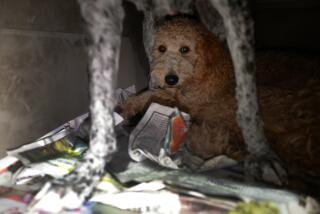Many X-Ray Operators Are Unskilled and Uncertified, State Says
- Share via
Each year patients in California are given X-rays by as many as 400 doctors and their employees who have either not been certified by the state to operate X-ray equipment or lack the skills needed for the specialized diagnostic procedures they perform, the state Department of Health Services said Friday.
Despite the findings, however, the state said that it takes little action against the individuals for violating state radioactive safety regulations other than a letter urging them to stop until they are certified.
Of the 400 unlicensed X-ray operators found during a reported 7,000 inspections each year, only “two or three” complaints are filed in court and most of those are settled before they go to trial, according to Irving Goldberg, head of the state Department of Health Service’s radiologic certification office.
“They apologize to us and, presumably they don’t do it anymore,” he said. He added: “The fact that the penalty for a violation is a misdemeanor means we’re not cops. We’re consultants.”
Only Letter of Warning
Goldberg said that private doctors and their employees could be expected to ignore the law, given the state’s practice of usually writing only a letter of warning.
But, he added: “One of the problems with getting the district attorney or the attorney general excited about unauthorized people taking X-rays is it isn’t very dramatic. There are no bodies on the street and it’s also not very remunerative.”
Diagnostic and therapeutic medical procedures are the largest single source of man-made radiation exposure to the public. Because of the possible risks of eventually causing cancer, state law requires that X-ray technicians be certified in the safe use of X-ray equipment.
The figures released by Goldberg during a telephone interview from Sacramento followed disclosures by The Times on Friday that more than 8,400 X-ray machines are overdue for required inspections in the state, about 3,200 of them in Los Angeles County. It has also been reported that there are at least an equal number of X-ray machines that have never been registered with the state. In addition, there is an inspection backlog in Los Angeles County for nearly 100 licensed users of radioactive materials, including academic institutions, businesses and hospitals.
Current and former inspectors said Friday that based on personal observations and experience during years of inspecting medical and dental offices, they believe that there are many more unlicensed X-ray operators, both doctors and technicians, than reflected in official state statistics.
“I think there’s as many X-ray technicians out there that are not licensed as are licensed,” said Jerome E. Caplan, who until last year was a 15-year veteran radiation protection specialist with the state Department of Health Services.
Caplan, who now is the owner-operator of a professional school for training X-ray technicians, said he was responsible for inspecting 1,500 medical offices from Fresno to the Mexican border.
Los Angeles County health physicist Kathleen Kaufman said she was particularly concerned about finding X-ray technicians who were not licensed and a podiatrist who apparently was “grandfathered in” when laws upgrading training requirements were put into effect in 1971.
Gave Recommendations
In each case, she said she offered recommendations on how to reduce radiation exposure to patients without compromising the quality of the X-ray.
“At both facilities they wanted to practice on themselves to see if it would work,” Kaufman said. “That’s illegal, and it just indicates that these people do not understand much about the dangers of radiation if they’re willing to practice on themselves,” she said.
California law contains different standards to be met for those who want to be certified in one or another speciality involving X-ray machines.
Generally speaking, a radiologic technologist and a therapeutic radiologic technologist require a completion of a two-year course of study and clinical training involving 455 to 500 hours. Limited-permit X-ray technicians are required to take at least 100 hours of basic subjects and additional instruction if they intend a speciality. Those who work in dental laboratories not owned by dentists must take 110 hours of instruction as well as additional specialized training.
Goldberg said he believes that the requirements result in turning out competent technicians and technologists.
Kaufman, who is a health physicists, said: “I also think our certification law, while better than no law at all, has definite areas where it can be improved. We inspect facilities where everyone is certified and everyone is operating legally, but they certainly don’t seem to know very much about radiation.”
More to Read
Sign up for Essential California
The most important California stories and recommendations in your inbox every morning.
You may occasionally receive promotional content from the Los Angeles Times.













